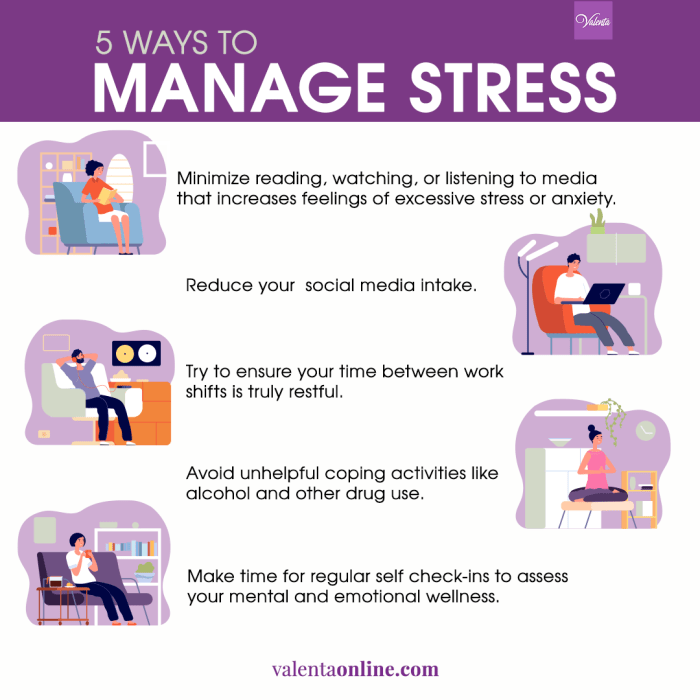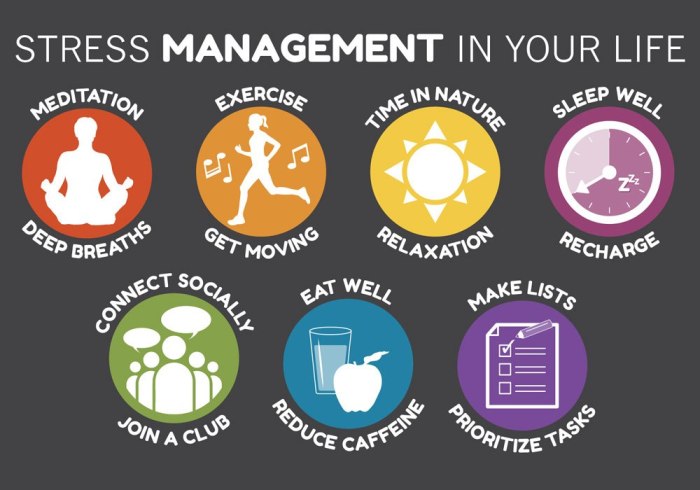Kicking off with Stress Management Tips, this guide will help you navigate the ins and outs of managing stress like a pro. From healthy habits to relaxation techniques, we’ve got you covered. So sit back, relax, and let’s dive in!
Introduction to Stress Management
Stress management is like your mental gym, helping you flex those coping skills to deal with life’s curveballs. It’s crucial for keeping your mind and body in check, preventing burnout and breakdowns.Unmanaged stress can be a real showstopper, messing with your mental health by causing anxiety, depression, or even leading to physical issues like high blood pressure and heart disease.
It’s like a ticking time bomb waiting to explode.
Common Stressors in Daily Life
- Work deadlines that feel like Mount Everest
- Relationship drama that’s juicier than a reality show
- Financial struggles that make you want to hide under your bed
- Health concerns that turn you into a hypochondriac
Healthy Lifestyle Habits

Eating right, staying active, and getting enough sleep are crucial components of managing stress effectively.
Nutrition for Stress Management
Eating a balanced diet rich in fruits, vegetables, whole grains, and lean proteins can help regulate mood and reduce stress levels. Avoiding excessive caffeine, sugar, and processed foods can also contribute to better stress management.
Exercise and Stress Reduction
Regular physical activity releases endorphins, which are natural mood lifters, helping to combat stress and anxiety. Aim for at least 30 minutes of exercise most days of the week to experience the stress-relieving benefits.
Sleep for Stress Relief
Quality sleep is essential for overall well-being and stress management. Create a relaxing bedtime routine, limit screen time before bed, and aim for 7-9 hours of sleep each night. Prioritizing rest can help you better cope with stress and improve your overall mood.
Relaxation Techniques
Feeling stressed out and overwhelmed? Here are some relaxation techniques to help you unwind and find your inner peace.
Deep Breathing Exercises
Deep breathing exercises are a simple yet effective way to calm your mind and reduce stress. By focusing on your breath and taking slow, deep breaths, you can activate your body’s relaxation response and lower your heart rate and blood pressure.
Mindfulness and Meditation
Practicing mindfulness and meditation can be powerful tools in stress reduction. Mindfulness involves staying present in the moment and being aware of your thoughts and feelings without judgment. Meditation helps to quiet the mind and promote relaxation, leading to a more peaceful state of mind.
Yoga and Tai Chi
Yoga and tai chi are ancient practices that combine physical movement, breathwork, and meditation. These practices can help reduce stress by promoting relaxation, improving flexibility, and increasing mindfulness. Engaging in regular yoga or tai chi sessions can be a great way to manage stress and improve overall well-being.
Time Management Strategies: Stress Management Tips
In today’s fast-paced world, managing our time effectively is crucial to reduce stress and increase productivity.Setting boundaries and prioritizing tasks are key components of effective time management.
Prioritizing Tasks
- Make a to-do list: Write down all tasks and prioritize them based on deadlines and importance.
- Use the Eisenhower Matrix: Categorize tasks into urgent, important, non-urgent, and non-important to focus on what truly matters.
- Avoid multitasking: Focus on one task at a time to improve efficiency and reduce stress.
Setting Boundaries, Stress Management Tips
- Say no when necessary: Learn to decline tasks that do not align with your priorities or goals.
- Establish work-life balance: Allocate specific time for work, relaxation, and personal activities to avoid burnout.
- Limit distractions: Minimize interruptions by setting boundaries with colleagues, family, and technology.
Organizing Schedules
- Use a planner or digital calendar: Keep track of appointments, deadlines, and events to stay organized.
- Break tasks into smaller steps: Divide large projects into manageable chunks to prevent feeling overwhelmed.
- Schedule breaks: Allow time for rest and relaxation to recharge and maintain focus throughout the day.
Social Support and Communication

In times of stress, having a strong social support system and effective communication skills can make a big difference in how we cope with challenges.
Role of Social Connections
Social connections play a crucial role in stress management as they provide us with emotional support, encouragement, and a sense of belonging. When we have friends, family, or support groups to turn to, we feel less isolated and more understood, reducing feelings of stress and anxiety.
Benefits of Seeking Support
- Increased feelings of belonging and acceptance
- Emotional support during difficult times
- Sharing experiences and gaining different perspectives
- Reduced feelings of loneliness and isolation
Effective Communication Tips
- Listen actively and empathetically to others
- Express your thoughts and feelings clearly and assertively
- Avoid making assumptions and seek clarification when needed
- Practice patience and understanding in conversations